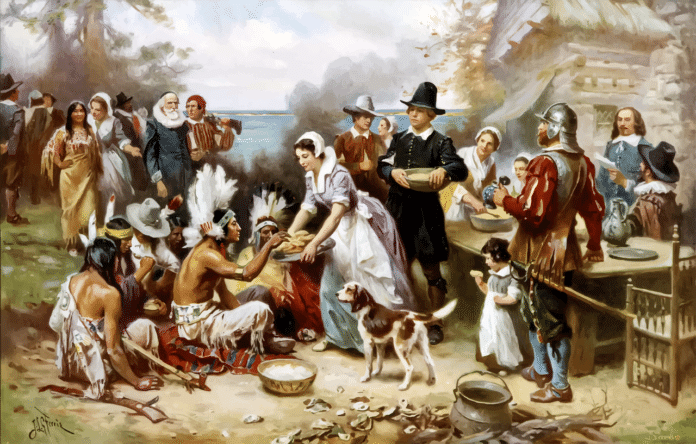Blame it, if you want, on critical race theory — or white supremacy under any other name such as culture cancel — but Thanksgiving may be the best example of how the failure of schools to teach history has impacted the way we celebrate even our oldest and uniquely American national holiday.
Obviously, big special meals where extended families and friends gather remain a staple of Thanksgiving as it was from the beginning.
Remnants of the competitive games and singing and dancing that were original in the observance remain with the major football games and movies on TV.
But where now is the spiritual element that was at the heart of the earliest celebrations and still present in 1789 when the first official act of Congress, after adopting the Constitution and Bill of Rights was to make the United States the only nation to have set a National Day of Thanksgiving.
In proclaiming the holiday, our first President, George Washington, urged the people of the United States to join in “public thanksgiving and prayer…acknowledging with grateful hearts the many signal favors of Almighty God.”
He later urged the citizens to ask “the great Lord and Ruler of Nations …to pardon our national and other transgressions… and generally to grant unto all mankind such a degree of temporal prosperity as he alone knows to be best.”
So let’s look again at the Pilgrims’ Thanksgiving celebration near Plymouth Rock (now Massachusetts) in 1621 from which most American holiday traditions come. (History tells us earlier ceremonies took place in short-lived settlements at Jamestown and Berkley Hundred (now Virginia) and possibly at Spanish St. Augustine in 1565.)
What we all remember about that celebration is lots of food after the former year’s failed crops. It included fish, deer and turkey, popcorn balls, squash and many more vegetables their Indian friends taught them to grow.
Leftovers lasted two more days along with the hunting and fishing competitions, games, dancing, and singing that history records.
Fewer and fewer people seem to be aware that the central feature of that celebration — and most of those official ones in our early days as a nation — was prayers and hymns of praise and gratitude to God.
How could younger people know when, since the 1970s, most history books used at the middle school (or junior high school) level fail to mention that those Pilgrims at Plymouth Rock were Puritans?
Puritans were fundamentalist Christians who were seeking a place where they could worship God freely in keeping with the way they interpreted the Bible. Sighting land in what is now Massachusetts ended a long and difficult journey from England by way of the Netherlands. They fell to their knees singing hymns and, thanking God, signed a contract declaring that what they were undertaking was “for the glory of God and advancement of the Christian faith.”
Depending on what history you read, you may not know that the Wampanoaq Indians welcomed the Pilgrims. They did not fear the newcomers were there to take the New England territory thousands of Wampanoaq had occupied for generations. The Mi’kmaq warriors and Narragansett from the north and Pequot tribe from the west already had taken most of it during years of tribal warfare.
Considering the Pilgrims as allies, Massasoit, the local Wampanoaq leader, gave them land on which to live and cultivate.
That’s not to “whitewash” much of European colonization of America which involved taking of land native Americans (they were not “indigenous” because anthropologists have established their ancestors came from what now is the Soviet Union) would not sell or occupy.
As the European population grew, so did the number who were not committed Christians or strongly related to religious institutions of any faith. Those numbers and the spiritual influence on public opinion have fluctuated ever since, more intense during war years and immediately after.
In many ways the holiday celebration begun there seems strong as ever. The question is: will prayers and songs of thanksgiving to God be a part of the celebration at your house or anywhere else this Thursday?
Or is the uniquely American tradition losing its heart?
(Adon Taft was the religion editor for 37 of his 48 years with The Miami Herald. He taught social studies at Miami-Dade Community College and authored the chapters on religion in the three-volume history of the state, “ Florida from Indian Trail to Space Age,” edited by Dr. Charlton W. Tebeau and Ruby Leach Carson.)

